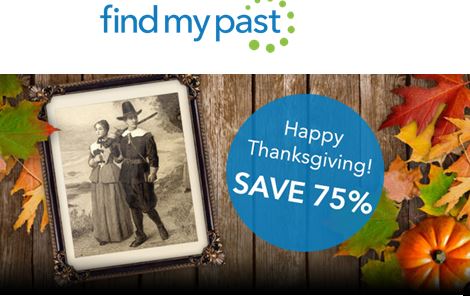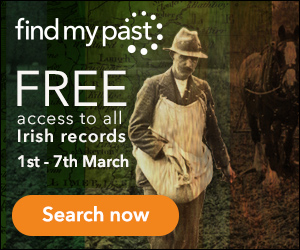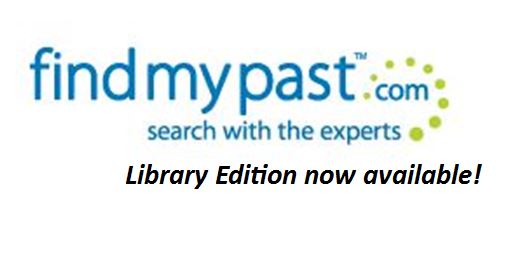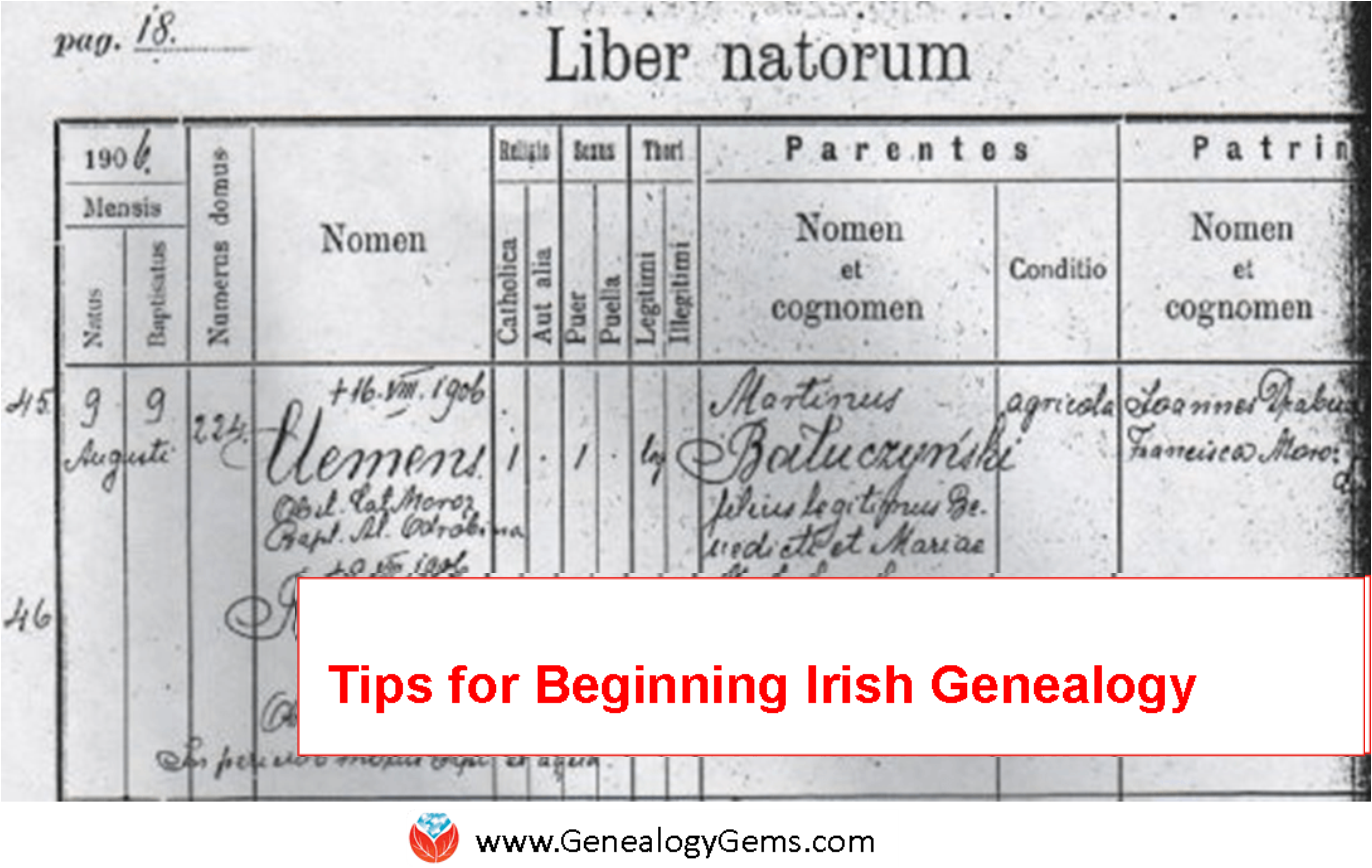by Lisa Cooke | Mar 1, 2016 | 01 What's New, Findmypast, Irish, Records & databases
Here are 3 essential tips for beginning Irish genealogy from Brian Donovan, Head of Irish Data and Development at Findmypast. Plus we’ll highlight Findmypast’s enormous collection of Irish records.
It’s March now, and time to start celebrating all things Irish! Findmypast.com is one of the best resources for Irish genealogy research, thanks to their enormous index of Irish Parish Records (1670-1900). The index has 40 million names from 1,000 parishes across all 32 counties of Ireland and links to digitized content at the National Library of Ireland.
According to Findmypast, parish records are “the most important resource for Irish ancestors prior to the 1901 census, allowing researchers to trace their roots back to Pre-Famine Ireland.” Let’s hear from Findmypast’s Irish research expert to help you get started in finding your Irish ancestors.
Beginning Irish Genealogy: Tips to Get Started
It can be intimidating to start researching Irish genealogy. I asked Brian Donovan, Head of Irish Data and Development at Findmypast, to answer 3 key questions: 
Q: How do I know if I’m ready to “cross the pond” back to Ireland? What information should I have?
A: Before looking through Irish records…you’ll want to know as much as you can about the origins of your immigrant Irish ancestor. Obviously you’ll need to know their name and date of birth, but the really key piece of information is their place of birth – that’s absolutely essential, especially if you have a common last name. At minimum, you would need to know the county, but knowing the parish or townland is even more helpful. With our new parish records, however, it’s much more possible to make progress knowing only the county. Additionally, knowing the names of other family members, such as their parents or siblings, buy hypothyroid medication will also help locate your Irish family before they left.
Q: What are the first Irish records I should search? Does that change by time period?
A: It definitely depends on the time period. If you know your ancestors migrated after 1901, that’s easy – start with the 1901 Census of Ireland. If they left Ireland prior to that, focus on the civil registers of birthsand of course the parish records. Civil registration began in 1864, so if they [left] before that, your best option is to look in the parish records and land records (like Griffith’s Valuation). This is why we’re so thrilled to be releasing these parish records: a huge portion of Irish emigrated before 1864, so prior to this release the only major record sets to work with were land records (though there are others that can be helpful too).
Q: What language or languages should I expect to encounter in Irish records?
A: Mostly English, but some parish registers are in Latin, the official language of the Catholic Church during the time period the records span. Irish was widely spoken and many people could only speak Irish, but the language was never used in official records.
More Irish genealogy resources:
Are you just beginning Irish genealogy? Find more great tips for getting started here. Book Club Gem: Suggested Read for Irish-Americans  The Story We Carry in Our Bones: Irish History for Americans by Julienne Osborne-McKnight. This book was recently recommended via the Genealogy Gems Book Club. According to the book description, this history begins in deep history with the Celts and Vikings. It explains the events that led up to the great potato famines, and follows the Irish exodus to the U.S., where she then traces Irish-American life. Click here to find more book suggestions for those who {heart} family history.
The Story We Carry in Our Bones: Irish History for Americans by Julienne Osborne-McKnight. This book was recently recommended via the Genealogy Gems Book Club. According to the book description, this history begins in deep history with the Celts and Vikings. It explains the events that led up to the great potato famines, and follows the Irish exodus to the U.S., where she then traces Irish-American life. Click here to find more book suggestions for those who {heart} family history.
by | Nov 24, 2015 | 01 What's New, British, Findmypast, Irish
 We see a lot of genealogy website subscription deals. This one for a findmypast subscription is fantastic! Don’t miss it if you have UK roots. Keep reading for the special link and coupon code that you’ll need for the discount.
We see a lot of genealogy website subscription deals. This one for a findmypast subscription is fantastic! Don’t miss it if you have UK roots. Keep reading for the special link and coupon code that you’ll need for the discount.
This weekend, findmypast is celebrating Thanksgiving with a highly tempting offer: a full 75% off a 12-month World subscription (usual cost: $199.50; your cost: about $50–for the entire year!).
- CLICK HERE and set up a free trial account
- Then go click My Account
- Click Subscribe
- Enter the code THNKSGNG15 on the right hand side of the page in the Discount Code field by Monday, November 30, 2015.
If you have roots in England, Wales, Scotland or Ireland, you should be using Findmypast to research them. For those readers in the US, Findmypast estimates that 35 million of us are descended from those first 51 Mayflower passengers (including these celebrities). And that’s just from those 51 people! That doesn’t hold a candle to the millions of other UK descendants who now live all over the world.
Findmypast is home to millions of records you will find only there, from British and Irish newspapers to the crucial 1939 Register. The site has strengthened its US, Canada and Australia collections to help descendants trace their families back to their British, Irish, Welsh or Scottish roots.
This weekend, findmypast is celebrating Thanksgiving with a highly tempting offer: a full 75% off a 12-month World subscription (usual cost: $199.50; your cost: about $50–for the entire year!). CLICK HERE and use the coupon code THNKSGNG15 by Monday, November 30, 2015 to get the discount.
More UK Research Gems
 Access the 1939 Register Online at Findmypast
Access the 1939 Register Online at Findmypast
The Bombing of London: Interactive Map of The Blitz
Irish Catholic Parish Registers from the National Library of Ireland
by | Nov 2, 2015 | 01 What's New, British, Census, Findmypast, Records & databases
 The 1939 Register–the most comprehensive population survey EVER of England and Wales known–is finally searchable online!
The 1939 Register–the most comprehensive population survey EVER of England and Wales known–is finally searchable online!
Today FindMyPast, in association with the U.K.’s National Archive, has launched a digitized, searchable version of the 1939 Register. This major record set fills a major gap at a pivotal time in history.
“Anyone can now discover their family, their home and their community on the eve of WWII,” states a FindMyPast release. “Until now, the most recent information available was the 1911 census. Owing to the 100 year rule, the 1921 census will not be released until 2022, while the 1931 census was destroyed in the war and the 1941 census was never taken. The 1939 Register therefore bridges an important 30-year gap in history.”
“In September 1939, WWII had just broken out,” explains Findmypast. “65,000 enumerators were employed to visit every house in England and Wales to take stock of the civil population. The information that they recorded was used to issue Identity Cards, plan mass evacuations, establish rationing and co-ordinate other war-time provisions….
“Each record includes the names of inhabitants at each address, their date of birth, marital status and occupation….Comprising 1.2 million pages in 7,000 volumes and documenting the lives of 41 million people, the 1939 Register opens a window to a world on the brink of cataclysmic change.” Some of the records even include changes made clear up to 1991.

Additionally, Findmypast has added unique period photographs, infographics, regional newspaper articles and maps “personally tailored to each record.” They are promoting a “rich and unique user experience unrivaled by any other family history research tool to date.”
What about privacy concerns? This is a relatively recent record set: more recent than national censuses that DO have privacy restrictions on them. About 28 million records have been cleared of privacy restrictions. The remainder will remain temporary closed, “either because the individual recorded is still living and less than 100 years old or proof of death has not been verified….The Register will be updated weekly….Records will also be opened as people reach the age of 100 years+1 day.”
Interestingly, it appears individuals may have the ability to show proof of death to have records released: “Findmypast, working with The National Archives, will have an ongoing process to identify records which can be opened on proof of death provided either by matching against robust data sets or supplied by users.”
The Register is free to search on Findmypast. Charges apply to view the records, with discounts for subscribers and pay-per-view packages starting at £6.95.
More Research Gems for English Genealogy
 WWII Documents at the National Archive (U.K.)
WWII Documents at the National Archive (U.K.)
The Bombing of London: Check Out this Interactive Map of the Blitz
Findmypast Library Edition: Request it at Your Public Library!
by Lisa Cooke | Jul 7, 2015 | 01 What's New, Australian, British, Canadian, Findmypast, Irish, Libraries, Records & databases, United States
 findmypast now has a Library Edition available within the United States. Patrons of subscribing libraries can now have access to their billions of records from England, Ireland, Wales, Scotland, Australia, New Zealand, Canada and the United States.
findmypast now has a Library Edition available within the United States. Patrons of subscribing libraries can now have access to their billions of records from England, Ireland, Wales, Scotland, Australia, New Zealand, Canada and the United States.
Highlights of what you’ll find on findmypast Library Edition include:
- Largest online collection of U.K. parish records;
- Exclusive access to the new PERiodical Source Index (now with images);
- Most comprehensive Irish family history records in the world.
Findmypast’s version of PERSI, the Periodical Source Index, includes more than 2.5 million indexed entries from thousands of genealogical and local history publications–AND a growing number of digitized articles! Click here to read more about PERSI, which we love.
Here’s How You Can Use FindMyPast for Free
We asked Josh Taylor at FMP how subscribers and non-subscribers can use the Library Edition:
1) “FMP subscribers can login to their own accounts while at the library.”
2) “Also, library users who are not paid subscribers can create a free account that allows them to create a tree, store, and attach records they view while at the library. The free account works like a standard Findmypast account so can be used at home to access their tree (and even get automatic hints).”
We’ve blogged about the Hints feature here at Genealogy Gems.
 Ready to do some library research? We’ve got more tips for you, like:
Ready to do some library research? We’ve got more tips for you, like:
Finally, here’s an important tip: let your voice be heard at your public library! They need to know how many people care about genealogy and family history. They need to know what databases you’re most interested in accessing. In an era of struggle for many public libraries, they have to prioritize their energies, so tell them what you want to learn!












